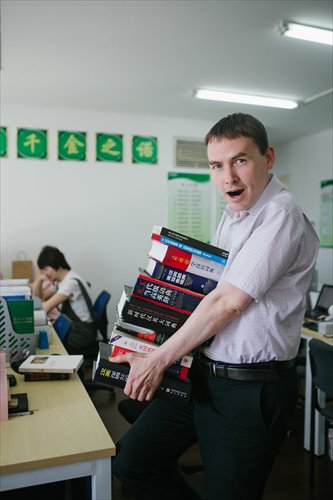Foreigners with a talent for Chinese are joining China’s growing market for translators

For Zachary Lundquist, who has worked as a Chinese-English translator in Beijing for five years, one of the biggest challenges of his job is translating Chinese political terms. Photo: Li Hao/GT
Almost five years later, 30-year-old Jake Kane (pseudonym) can still remember the deer-in-headlights sensation that prickled along the back of his neck as a room full of British and Chinese government officials stared at him expectantly.
A translator and interpreter with the British Embassy in Beijing, Kane, who got his master's degree in Chinese at the University of Sheffield in 2010, was used to working official events, but this day represented a special challenge.
A group of British experts were visiting Beijing, and he - armed with little more than a blank notepad and a pen - was the sole English-language translator responsible for interpreting at six hour-long meetings between officials, all on different topics. As they launched into the dense material, Kane started to get the inkling he might be in over his head.
"These guys were discussing very technical subjects, and much of the English terminology was new to me, let alone the Chinese terms," he remembered.
Most challenging was translating the talks by the British experts, who tended to speak off the cuff. The Chinese interpreters had it easier - they simply read pre-translated versions of the Chinese officials' pre-written speeches, he said.
Still, Kane, who has since returned to London, where he works as a civil servant, has fond memories of his days in Beijing, where he worked from 2010 to 2012.
"Overall it was a very interesting role as it gave me access to people and places that most foreigners would never see. But it could be very challenging," said Kane.
That hasn't stopped an increasing number of foreigners with a flair for Chinese from flocking to China, where efforts to expand the country's economic, political and economic reach around the world have created a growing market for translators and interpreters.

As China expands its influence and business interests overseas, the country is seeing increasing demand for translators. Photo: IC
China's growing demand for translators
Jeremy Ryder, a 35-year-old Australian who has been living in China for nine years, remembers that just six years ago, when he started working as a translator and interpreter for IBM in Shanghai, foreign translators or interpreters like him were few and far between.
Since then, though, Ryder has seen more and more translators entering the industry, thanks not only to growing demand, but to the growing number of foreigners being exposed to Chinese.
Like most other foreign translators, one of Ryder's biggest reasons for becoming a Chinese language translator was his great love for China and Chinese culture.
"Although it's not easy, the job keeps me focused [on Chinese], keeps me alert and keeps me learning all the time," said Ryder, who now works as a full-time Chinese-to-English (C-E) translator at Huawei in Shenzhen, Guangdong Province.
While China is also home to plenty of its own translators, Kane has found that overseas clients often prefer native English-speaking interpreters as it makes communication easier, and because they understand more about Western business culture.
For instance, in meetings, Kane pointed out that it's easier for native English-speaking translators to pick up on idiomatic expressions and subtle shades of meaning of Western speakers, allowing them to translate more effectively.
Foreign translators who live in China can also serve as a cultural bridge between the two sides during negotiations in a way that Chinese translators, many of whom have only lived in China, can't, said Kane.
In addition to government bodies and foreign corporations, a growing number of Chinese companies that want greater leverage in their dealings with overseas partners are seeking out foreign translators and interpreters.
Ryder works in Huawei's localization division, which helps the company expand in overseas markets. His everyday work involves C-E translation and proofreading of local product descriptions, legal documents and so on.
"Currently, the company I work for and other telecommunication companies are hiring native English speakers with fluent Chinese as translators because they have realized the need for this. It is a better way to ensure better quality translations," said Ryder. "There are more and more foreigners who are achieving high levels of Chinese, and Chinese companies are becoming more global and hiring more foreign talent."
Zachary Lundquist, a 33-year-old American who has been working as a full-time translator for over five years, has also noticed this shift. Lundquist, who currently works at Beijing Spirit Translation Company, said both foreign and Chinese clients often request foreign translators, as they think it will take less time and make the final product more authentic. "Chinese companies are not satisfied anymore with the translations of Chinese translators, which may contain Chinglish. They want to use foreign translators to get a more professional and international image among foreign partners or customers."
Grasping nuance: training to be a qualified interpreter or translator
For Lundquist, who mainly does C-E translation, one of the biggest challenges he's faced is translating materials that contain a lot of political terms and historical references, which require a great deal of background knowledge.
When he first saw expressions like "two sessions," "three representatives" and "One Belt, One Road," he would understand their meaning on a literal level, but only later came to understand the many layers they implied, in the same way that a four-character chengyu, or idiom, requires knowledge of history and many paragraphs to explain.
"China is so fast-changing that a lot of new words, concepts and ideas are coined every day," he said.
"One of the biggest challenges is to find out whether to translate it liberally or literally. Comparatively speaking, English expressions are more succinct and Chinese expressions have more meanings."
In Chinese, it's more common to use a string of adjectives to describe things, while English professional writing strives more to be succinct. It's a difference that Lundquist often has to explain to Chinese clients, who are used to getting more literal, sometimes "Chinglishy" translations.
As for metaphors or idioms, Lundquist usually starts out by uncovering the source of the expression, and then deciding whether to translate it literally, or to take liberties in an effort to retain its meaning and music.
Ryder agrees that one of the biggest challenges for foreign translators is grasping the exact meaning of the Chinese source text.
"It's no good saying it's mainly understood. It really has to be thoroughly understood," said Ryder.
This means learning from a range of sources. Kane, for example, attributes his mastery of Chinese to intensive self-study and his five years of immersion in China in addition to more formal academic study.
Prospects for other languages
It isn't just translators from English-speaking nations who've been finding work in China. Parov Mukhamed, a 24-year-old student from Kazakhstan who studies at Shaanxi Normal University, has recently found himself busy with Chinese-Russian interpretation work at the Silk Road International Exposition held in Xi'an, Shaanxi Province.
Over the past year or so, Mukhamed has found growing opportunities to work for Chinese international trade companies, who need interpreters to help facilitate conversations between Chinese leaders and foreign clients who speak Russian.
"I think there will be a great demand for translators doing non-English-to-Chinese translation in the future, such as Russian and African languages," said Mukhamed.
After graduating this July, he plans to find a job in international trade or translation.
"I look at Chinese-to-Arabic or Chinese-to-Russian as markets in which it is hard to find a good supply [of translators]," said Matt Conger, cofounder and CEO of SeekPanda, a company that matches interpreters with consumers from the US and Asia online.
"As Sino-US and Sino-European trade is relatively stabilized, a number of Chinese companies are heading to Africa or other countries for investment, so we need more foreign translators or interpreters for new language pairs such as French-Chinese or other languages of African countries," said Conger.
This presents opportunities for a much wider swath of foreigners studying Chinese - not to mention more fun for those who love learning new languages. Ryder, for instance, is pleased that he's finally getting a chance in his recent work to use Cantonese.
"Anybody can speak the Chinese/English combination. That was special 40 years ago, but not anymore. Trilingual or multilingual is much more valuable," he said.
Newspaper headline: Masters of Mandarin